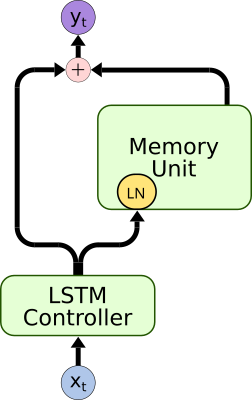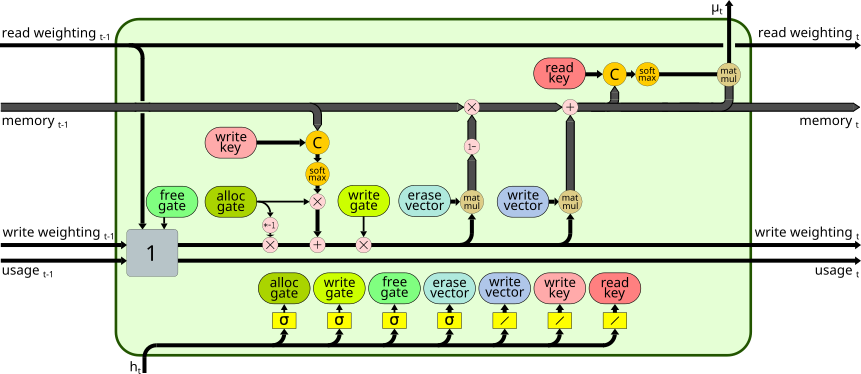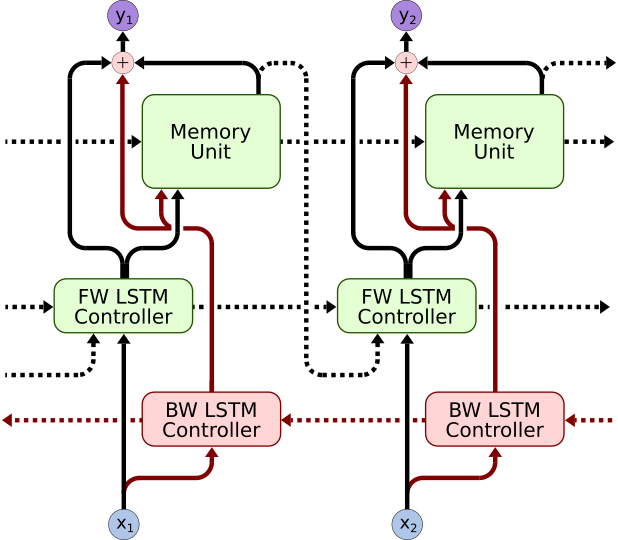| adnc | ||
| experiments/pre_trained | ||
| images | ||
| test | ||
| .gitattributes | ||
| .gitignore | ||
| .travis.yml | ||
| inference_babi_task.py | ||
| LICENSE | ||
| README.md | ||
| requirements-gpu.txt | ||
| requirements.txt | ||
| setup.py | ||
Advanced Differentiable Neural Computer
THIS REPOSITORY IS IN CONSTRUCTION, NOT EVERYTHING IS WORKING FINE YET
This repository contains a implementation of a Differentiable Neural Computer (DNC) with advancements for a more robust and scalable usage in Question Answering. It is applied to:
- 20 bAbI QA tasks with state-of-the-art results
- CNN Reading Comprehension Task with passable results without any adaptation.
This repository is the groundwork for the MRQA 2018 paper submission "Robust and Scalable Differentiable Neural Computer for Question Answering". It contains a modular and fully configurable DNC with the following advancements:
The plot below shows the impact of the different advancements in the word error rate with the bAbI task 1.
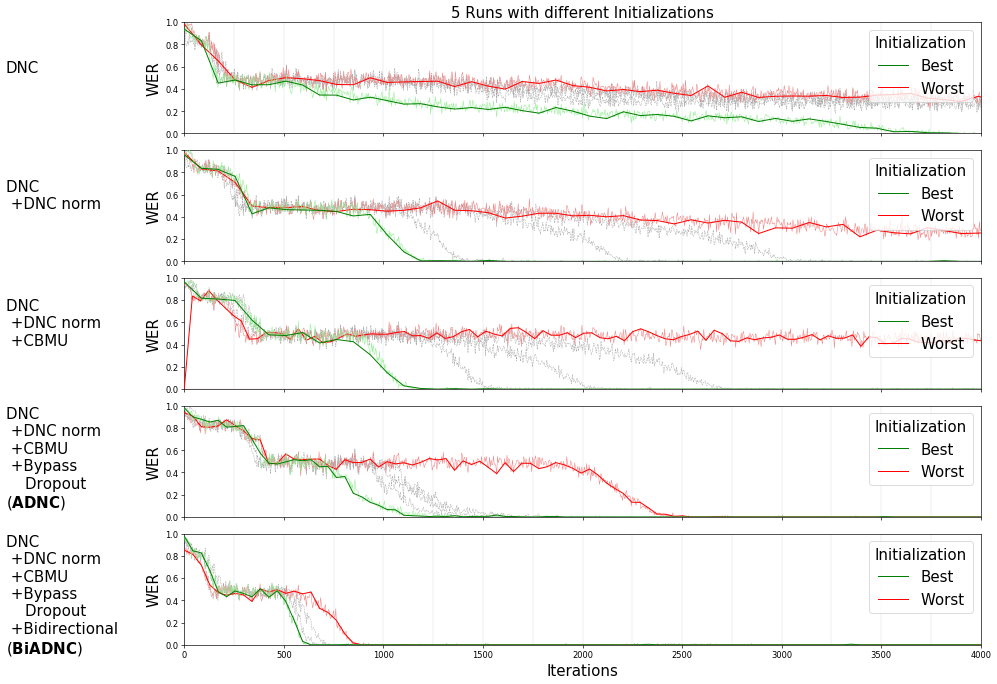 |
|---|
Furthermore, it contains a set of rich analysis tools to get a deeper insight in the functionality of the ADNC. For example that the advancements lead to a more meaningful gate usage of the memory cell.
| DNC | ADNC |
|---|---|
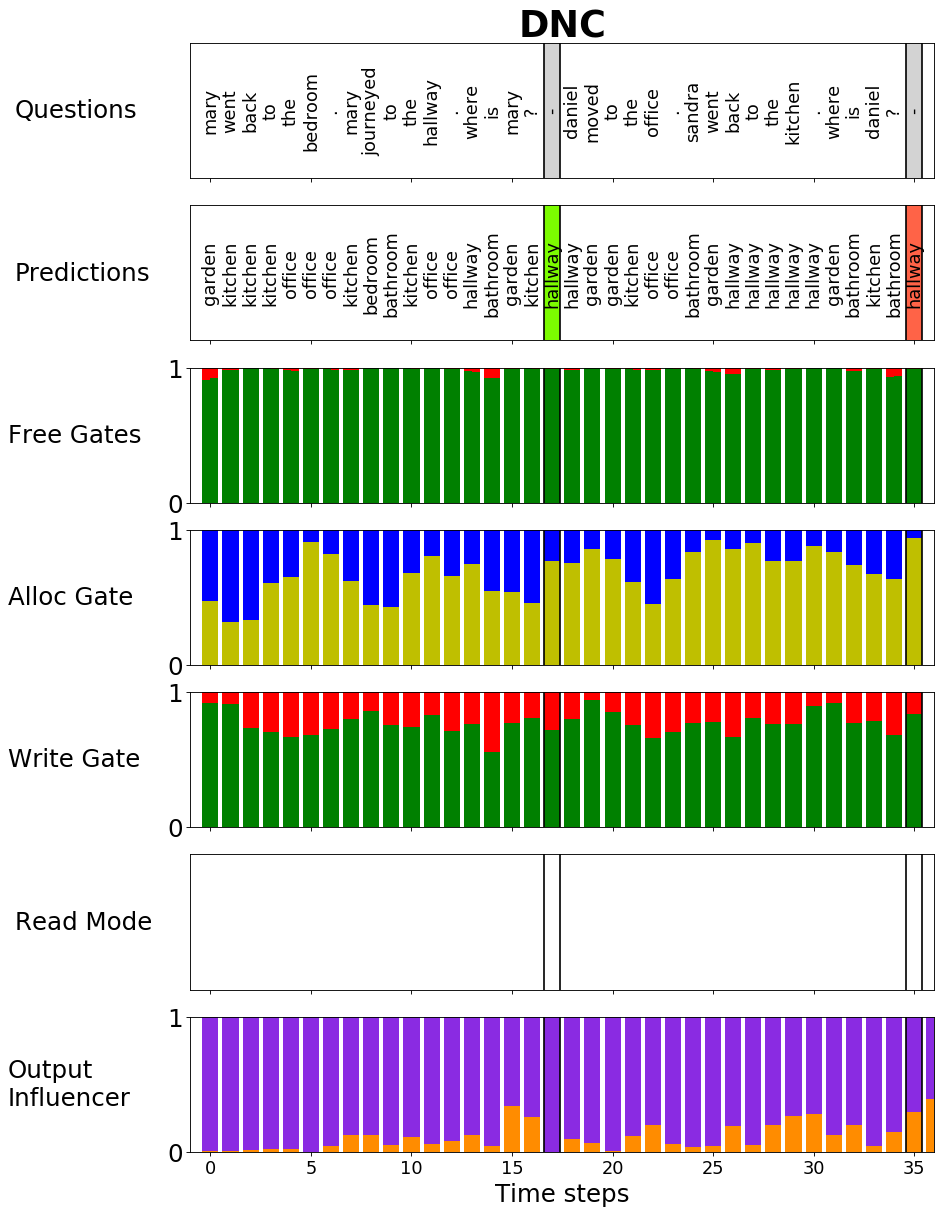 |
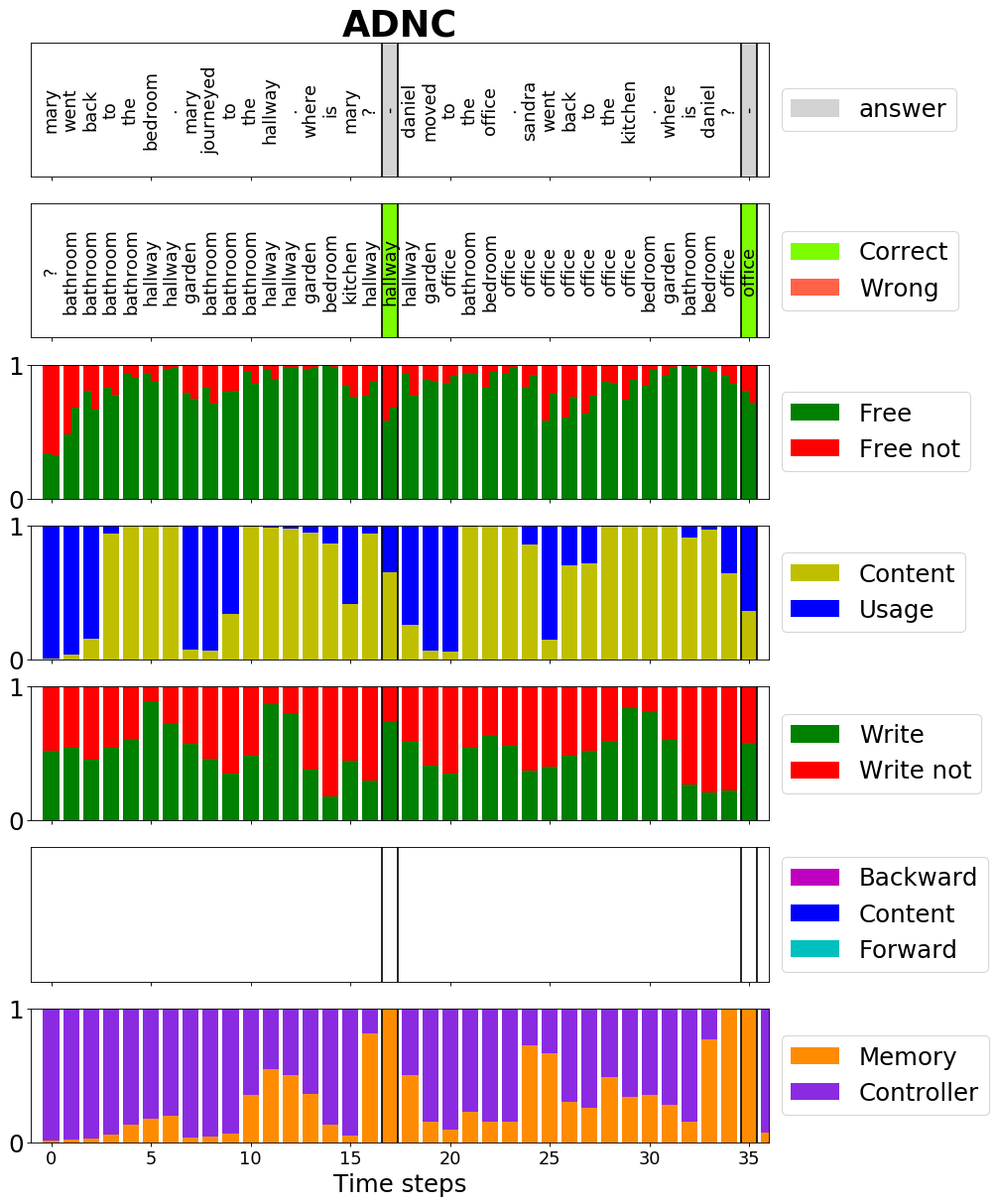 |
How to use:
Setup ADNC
To install ADNC and setup an virtual environment:
git clone https://github.com/joergfranke/ADNC.git
cd ADNC/
python3 -m venv venv
source venv/bin/activate
pip install -e .
Inference
For bAbI inference, choose pre-trained model (DNC, ADNC, BiADNC) in scripts/inference_babi_task.py and run:
python scripts/inference_babi_task.py
For CNN inference, choose pre-trained model (ADNC, BiADNC) in scripts/inference_cnn_task.py and run:
python scripts/inference_babi_task.py
Training
t.b.a.
Plots
t.b.a.
Repository Structure
t.b.a.
bAbI Results
| Task | DNC | EntNet | SDNC | ADNC | BiADNC | BiADNC +aug16 |
|---|---|---|---|---|---|---|
| 1: 1 supporting fact | 9.0 ± 12.6 | 0.0 ± 0.1 | 0.0 ± 0.0 | 0.1 ± 0.0 | 0.1 ± 0.1 | 0.1 ± 0.0 |
| 2: 2 supporting facts | 39.2 ± 20.5 | 15.3 ± 15.7 | 7.1 ± 14.6 | 0.8 ± 0.5 | 0.8 ± 0.2 | 0.5 ± 0.2 |
| 3: 3 supporting facts | 39.6 ± 16.4 | 29.3 ± 26.3 | 9.4 ± 16.7 | 6.5 ± 4.6 | 2.4 ± 0.6 | 1.6 ± 0.8 |
| 4: 2 argument relations | 0.4 ± 0.7 | 0.1 ± 0.1 | 0.1 ± 0.1 | 0.0 ± 0.0 | 0.0 ± 0.0 | 0.0 ± 0.0 |
| 5: 3 argument relations | 1.5 ± 1.0 | 0.4 ± 0.3 | 0.9 ± 0.3 | 1.0 ± 0.4 | 0.7 ± 0.1 | 0.8 ± 0.4 |
| 6: yes/no questions | 6.9 ± 7.5 | 0.6 ± 0.8 | 0.1 ± 0.2 | 0.0 ± 0.1 | 0.0 ± 0.0 | 0.0 ± 0.0 |
| 7: counting | 9.8 ± 7.0 | 1.8 ± 1.1 | 1.6 ± 0.9 | 1.0 ± 0.7 | 1.0 ± 0.5 | 1.0 ± 0.7 |
| 8: lists/sets | 5.5 ± 5.9 | 1.5 ± 1.2 | 0.5 ± 0.4 | 0.2 ± 0.2 | 0.5 ± 0.3 | 0.6 ± 0.3 |
| 9: simple negation | 7.7 ± 8.3 | 0.0 ± 0.1 | 0.0 ± 0.1 | 0.0 ± 0.0 | 0.1 ± 0.2 | 0.0 ± 0.0 |
| 10: indefinite knowledge | 9.6 ± 11.4 | 0.1 ± 0.2 | 0.3 ± 0.2 | 0.1 ± 0.2 | 0.0 ± 0.0 | 0.0 ± 0.1 |
| 11: basic coreference | 3.3 ± 5.7 | 0.2 ± 0.2 | 0.0 ± 0.0 | 0.0 ± 0.0 | 0.0 ± 0.0 | 0.0 ± 0.0 |
| 12: conjunction | 5 ± 6.3 | 0.0 ± 0.0 | 0.2 ± 0.3 | 0.0 ± 0.0 | 0.0 ± 0.1 | 0.0 ± 0.0 |
| 13: compound coreference | 3.1 ± 3.6 | 0.0 ± 0.1 | 0.1 ± 0.1 | 0.0 ± 0.0 | 0.0 ± 0.0 | 0.0 ± 0.0 |
| 14: time reasoning | 11 ± 7.5 | 7.3 ± 4.5 | 5.6 ± 2.9 | 0.2 ± 0.1 | 0.8 ± 0.7 | 0.3 ± 0.1 |
| 15: basic deduction | 27.2 ± 20.1 | 3.6 ± 8.1 | 3.6 ± 10.3 | 0.1 ± 0.1 | 0.1 ± 0.1 | 0.1 ± 0.1 |
| 16: basic induction | 53.6 ± 1.9 | 53.3 ± 1.2 | 53.0 ± 1.3 | 52.1 ± 0.9 | 52.6 ± 1.6 | 0.0 ± 0.0 |
| 17: positional reasoning | 32.4 ± 8 | 8.8 ± 3.8 | 12.4 ± 5.9 | 18.5 ± 8.8 | 4.8 ± 4.8 | 1.5 ± 1.8 |
| 18: size reasoning | 4.2 ± 1.8 | 1.3 ± 0.9 | 1.6 ± 1.1 | 1.1 ± 0.5 | 0.4 ± 0.4 | 0.9 ± 0.5 |
| 19: path finding | 64.6 ± 37.4 | 70.4 ± 6.1 | 30.8 ± 24.2 | 43.3 ± 36.7 | 0.0 ± 0.0 | 0.1 ± 0.1 |
| 20: agent’s motivation | 0.0 ± 0.1 | 0.0 ± 0.0 | 0.0 ± 0.0 | 0.1 ± 0.1 | 0.1 ± 0.1 | 0.1 ± 0.1 |
| Mean WER: | 16.7 ± 7.6 | 9.7 ± 2.6 | 6.4 ± 2.5 | 6.3 ± 2.7 | 3.2 ± 0.5 | 0.4 ± 0.3 |
| Failed Tasks (<5%): | 11.2 ± 5.4 | 5.0 ± 1.2 | 4.1 ± 1.6 | 3.2 ± 0.8 | 1.4 ± 0.5 | 0.0 ± 0.0 |



